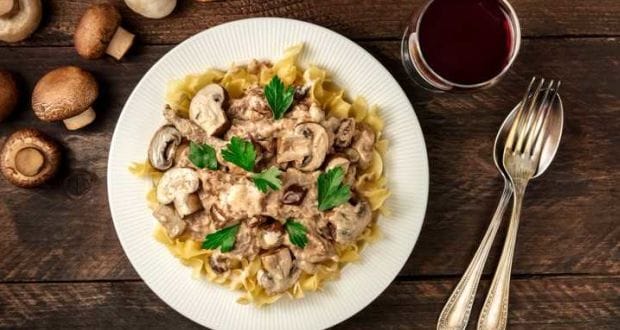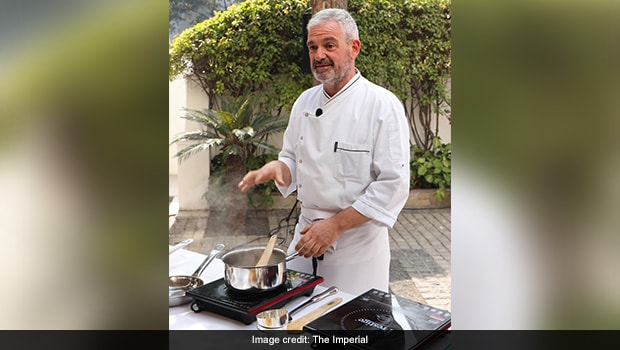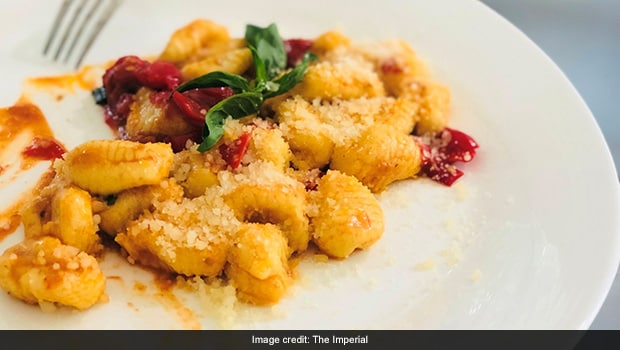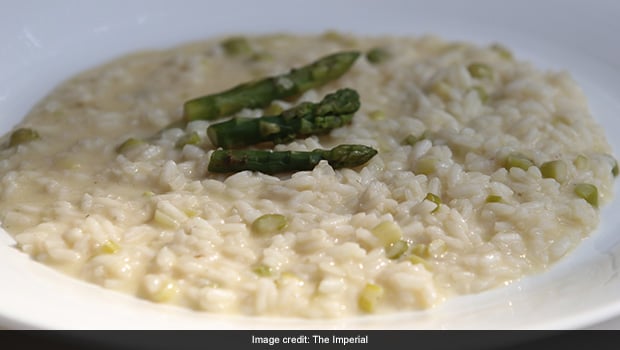
The Italian fare under the winter sun featured exclusive recipes by the Chef Fabrizio and Chef Gatto. Fiesole style potato dumplings with fresh tomato and basil sauce along with the classic Tiramisu was prepared live by Chef Fabrizio and Risotto Con Aspargi by Chef Gatto.
Here are some expert tips and tricks we picked from the session that will help amateur cooks get the authentic Italian fare right in the comforts of their kitchen.

Chef Roberto Gatto took the session under the open roof sky at San Gimignano Lawns
How To Cook The Perfect Tomato And Basil Sauce- Tips From Chef Fabrizio
1. Before making the sauce, cut out the garlic scapes. It makes the flavour much more stronger than needed.
2. Be careful of the quantity of water you add to the sauce. Water is good for tomatoes to cook but not so much for garlic. It would prevent the garlic from cooking and turning brown.
3. To make the tomatoes cook better, you can slightly press them in the pan while cooking.
4. Don’t add salt to the sauce. Definitely not in the preliminary stages of cooking. You may add it later, if you find the sauce too bland.
5. The time at which you add the salt is very important in Italian cooking. Add a pinch of salt to the water before you add the pasta, so that the pasta can absorb the salt. If you add salt to the sauce, the sauce takes the salt and not the pasta. Excess salt can meddle with the original flavours of the sauce.

Fiesole style potato dumplings with fresh tomato and basil sauce
Master the art cooking perfect Risotto with these insightful tips from Chef Gatto
1. Toasting the rice in melted butter is very important. According Chef Gatto, “It holds the glue inside the rice and prevents the rice from being sticky or mushy”. In other words, toasting the rice creates a hard shell around the grain, which helps the grain to absorb the moisture slowly. The chef also said that it is important to do so before adding the wine as the flavour may evaporate as the wine evaporates.
2. While adding the vegetable stock, make sure you don’t put all the stock to the risotto at once. That is one of the biggest blunder you can commit while cooking risotto. You have to keep adding the vegetable stalk slowly at regular time intervals during the course of cooking.
3. Chef Gatto also reinforces upon the usage of salt. You don’t have to add the salt to the toasted rice but to the vegetable stalk. Even while adding the salt to the stalk, make sure you don’t go overboard. Chef Gatto said, “Adding a lot of salt may prevent you from enjoying the flavours of rice, or the veggies, or any ingredients that you have used in all its glory. These days we are not habituated to taste the real flavours. We tend to complicate the dish with too much and something or the other often tends to disturb the balance of the dish with its overpowering flavour.”
4. It is preferable to use seasonal vegetables. Chef Gatto said, “I am using asparagus as it is in season. White asparagus is more nutritive than the green ones. End of February, March is the season of asparagus. It is also the season of artichoke. Using vegetables that are not in season not only compromises on flavour but also the nutritive value.”
5. Sautee and stir the toasted rice in melted butter for about 15-16 minutes. The older the rice, the longer it takes to cook.
6. The last step, or the mantecatura is one of the most essential parts of cooking Risotto. This is when the butter, Olive oil and Parmesan cheese is added to the rice in significantly large quantities. It is cooked in raised heat and in an angled position. This helps blend the ingredients well, makes it creamy and is very crucial to the cooking.

Risotto Con Aspargi Bianchi (White Asparagus Risotto)
Now that you have the secret tips in place, prepare the lip-smacking Italian treats like a pro. The Chefs are in Delhi for the first time. Italian food lovers can enjoy the authentic Italian flavours at San Gimigano, The Imperial from 5th February till 11th February 2018.
Italian cuisine has found many fans on the Indian shores. Apart from Chinese and American, Italian is perhaps the most consumed foreign cuisine in India. Some of us have even given our own desi interpretation to the Italian treats, so much so that there are many who are not even aware of the authentic Italian flavours. Also, there is no denying the fact that flavours and preparations differ from city to city. Be it Florence, Venice or Tuscany, each city has its own local distinction to their dishes.











